Have you ever wanted to sit down with a veteran of the essential oils world and just get some straight answers? Today we’re cutting through the fluff and asking 20 of your questions. Here are 20 critical questions answered about essential oils.
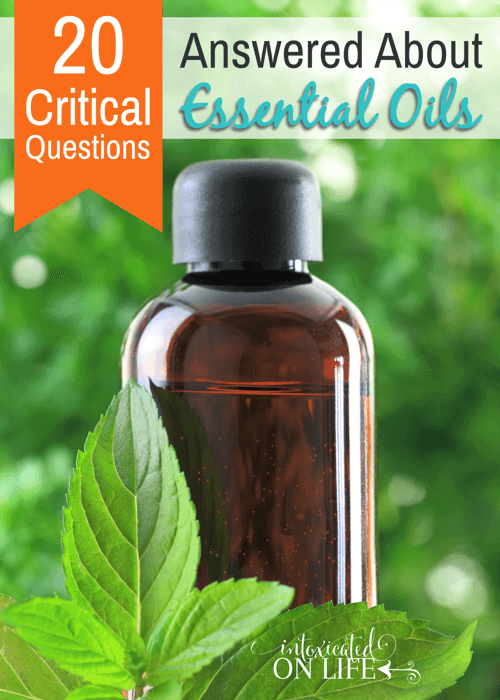
Asking an Essential Oils Company Owner
So far in our Skeptic’s Guide to Essential Oils series, we’ve talked about how essential oils work and we’ve discussed the hot topic of essential oil purity and how to choose a company. Of course, you should go with a company you are most comfortable with.
One of the things I have enjoyed in my research, is talking to essential oil experts. For this interview, I spoke with Paul Dean a former owner of a popular essential oil company. He has been very willing to answer any questions I might have as well as the top 20 questions about essential oils that YOU had. So I’m going to share that information with you.
20 Tough Questions Answered about Essential Oils
Here are the answers to 20 of your questions about essential oils. I have answered the first few with some background information and the rest are gleaned from phone and e-mail conversations with Paul.
Don’t see your burning question represented here? Leave a comment and I’ll do my best to get that answer for you! Yes, Paul has an interest in representing his company, but my experience has been that Paul is straightforward and does not shy away from hard questions, so ask away!
- Who is Paul Dean and why should I listen to what he has to say?
- What are essential oils and how do they work?
- How do you know which oils are quality when they all claim to be the best?
- What are the top facts/points someone should consider when it comes to oil purity and choosing a company?
- How can I tell the difference between adulterated oils and pure oils?
- How do I find out if a company I am considering sells adulterated oils?
- Why is it so important to buy high quality oils?
- What is the best method of using essential oils: applying to skin, diffusing, or internally?
- What do I need to know about using oils safely, especially in children?
- Is it really safe to ingest oils? I am very skeptical about this.
- Often people treat essential oils like a fix-all. Do essential oils really do “better” than conventional treatments?
- What’s a good book for beginners?
- What are the top 5 single oils a mom should consider buying for her family?
- What are the top 5 blends to have on hand?
- Can you over-use oils? Can they overload your system?
- What are the best ways to boost immunity with essential oils?
- What are the best oils for preventing and alleviating seasonal threats?
- Presumably oils won’t prevent and heal all seasonal threats. How do I know it’s working at all?
- Is there an oil that can help with treating bed wetting?
- What is the best oil for stomach or intestinal issues?
- Who is Paul Dean and why should I listen to what he has to say?
Paul Dean was the former owner of a popular essential oil company and is passionate about essential oils use, purity, and education.
- What are essential oils and how do they work?
See our first post in the Skeptic’s Guide to Essential Oils series: How Do They Work?
- How do you know which oils are quality when they all claim to be the best?
See our second post in the Skeptic’s Guide to Essential Oils series: Evaluating Essential Oils Companies.
- What are the top facts/points someone should consider when it comes to oil purity and choosing a company?
“Since most oils come from the so called experts, adulteration in the industry is rampant,” Paul said. “Most people do not know they are using adulterated oils.” (Paul is publishing a book later this year packed with helpful details on this.) The top three things you want to look for when choosing a company are:
- Selling mostly all Wild or Organically Grown oils.
- No synthetics or adulterating of the oils. This is harder since the “experts” hide their adulteration, so find a company that is purchasing the oils direct from the farms instead of through these “experts.”
- Proper extraction of the essential oils (i.e., no added pressure and for the therapeutic properties).
- How can I tell the difference between adulterated oils and pure oils?
The more experience you gain and the more sensitive you get to oils, you will begin to tell the difference by smell and effectiveness. For example, pure peppermint has a more “herby” scent rather than the sharp mint scent you get with improperly extracted oils. But when you’re first starting out, you probably won’t be able to tell.
- How do I find out if a company I am considering sells adulterated oils?
Paul estimates that “90-95% of the higher-end oils on the market are adulterated.” He adds that “ten years ago I would have said 99% but now it’s improving a bit” as smaller companies crop up that are dedicated to purity and proper farming and extraction practices. “Most oils are supplied by the essential oils ‘experts’ that have large volumes of oil available.” They may have a 5k acre lavender field, for example, so they’ll get a lot of oil compared to a 5 acre lavender field. Most of the oils are supplied by the “experts,” so there’s not a whole lot of difference between the oils available.
“It comes down to the adulteration factor,” Paul says. Companies will say they sell all-natural therapeutic grade oil, etc., but they’re actually often only 5% pure and 95% synthetic. How is that possible? With the “experts” working on the oils after extraction, they can be passed as 100% pure and unadulterated. Paul points out “there’s a reason France exports more 100% pure lavender oil than they grow every year. Something fishy is going on there. Many companies buy these oils from the experts and then adulterate them further from there.” For example, they might mix oils of different qualities because the resulting oil will still pass the tests for purity.
Then there are farming and extraction issues. “When you have a large farm, you’re going to deal with large farm problems and issues. At harvest time, you only have a certain amount of time—a couple of weeks—to get your harvest in and distilled before it becomes worthless. These large farms do the tricks of the trade to get as much oil out of the plant as quickly as possible.” This often lowers the quality of the oils in ways that aren’t as obvious with the standard tests. In addition, having several distillers doing low pressure, low temperature extraction at the same time is more expensive, so quicker and less ideal extraction methods are usually employed.
Paul says that, in general, it’s best to find a company that uses small locally-operated farms that grow the plants in their native environment, taking the best care of their plants with a hands-on approach and traditional farming, and distill the oils properly with quality in mind (i.e. using an open system with no added pressure and no high temperatures).
- Why is it so important to buy high quality oils?
Higher quality organic oils will do a few things for you: A bottle lasts much longer because it’s not “watered-down” with fillers. The oil is pure, and so no additives are absorbed into your body. You also get a better value than when buying low-quality oils because a little of the oil lasts much longer (no fillers) and is more potent (higher therapeutic value).
- What is the best method of using essential oils: applying to skin, diffusing, or internally?
“Depends on what you’re trying to do. The quickest way to get it into your bloodstream is through smell, where it rapidly absorbs into the blood. That’s also the only way to effect certain parts of the brain. But if you fall down and get a sprained ankle, for example, you apply it locally.”
- What do I need to know about using oils safely, especially in children?
“If you look at the toxicity level of most of the oils you are looking at, it’s not that concerning. If you use common sense, you won’t drink a gallon of tea tree oil. Nearly everything is toxic if you use too much of it. Just keep the general rule that the smaller the child, the more diluted the oils should be. A 1:20 ratio of essential oils to carrier oils is a good place to start.” (Carrier oils include coconut oil, olive oil, nut oils, and many others.)
Do what is in your comfort level. A good book will tell you what you may want to look out for as far as which oils are “hot” or might be best to stay away from with children. For most oils, just use your common sense and start highly diluted and decrease dilution until you find a ratio that is effective. Paul is not as concerned about it as he used to be, and suspects that those who are overly concerned about safety (don’t ever ingest, don’t ever use with kids, etc.) are either misinformed or really more concerned because of the additives in the oils.
- Is it really safe to ingest oils? I am very skeptical about this.
“If you do it safely, there are some powerful benefits for ingesting the oils: protecting cells, detoxing, addressing specific intestinal issues. But mostly you don’t need to take them internally. They work so powerfully externally that you can skip the whole digestive process and use them more effectively other ways. Smelling is the quickest way to get an oil into your bloodstream. I really don’t take many oils internally and would advise people to do the same.”
- Often people treat essential oils like a fix-all. Do essential oils really do “better” than conventional treatments?
Paul laughed, then said, “That’s a complicated question! All the modern treatments have their basis in organic chemistry. Pain killers originally came from the white willow bark. That’s why the billions of dollars are done on plant research at the universities, because the companies want to find the next latest, greatest treatment. If they do all this research on plants, isolate a chemical, and learn how to synthetically create a chemical. Chemically based treatments can be very very powerful, and they can be a lot more powerful than just the plant because they are super isolated, depending on their purpose and intended usage.
“Now, all synthetic treatments are toxic to the body. There’s not one that does not cause harm to the body. So, long term use of synthetic treatments is very harmful. Essential oils can also be very powerful and very healing. They are super concentrated plant treatments much like the synthetic treatments, especially if you find the right oil for your particular concern. Personally, I believe that there is a lot less harm, if any, done by the pure oil than by the synthetic pharmaceuticals, but again you’ll have to use them with wisdom. It may take a while, but everyone who continues to use oils will become sold on them. Many come to essential oils when modern treatments have failed, and we turn around and get rapid results with the essential oils. Over time, you will find that essential oils really do work so well, so quick, and so powerfully.”
(I appreciated that with all the stories of successful essential oil uses, Paul also brought up times when certain oils didn’t work as well for him as they did for others.)
- What’s a good book for beginners?
“We sell Bevonne’s book called The Healing Powers of Liquid Copals, and that is a good book. Really, grab any book and start reading and using the oils.” Paul also has a book he hopes to publish by the end of the year.
- What are the top 5 single oils a mom should consider buying for her family?
“Lavender, Peppermint, Lemon, Melaleuca, and Eucalyptus. If you can afford it, replace Lemon with Frankincense and Melaleuca with Helichrysum.”
- What are the top 5 blends to have on hand?
A digestive, discomfort relief, germ-destroyer, calming and immune booster.
- Can you over-use oils? Can they overload your system?
“You can over-use the oils and cause an ‘Improvement Reaction,’ detoxifying too quickly. If you use an extreme amount of oil it can be harmful. To much oil on the skin can ‘burn’ it. Taking to much oil internally will kill your good intestinal bacteria.”
Use the oils with wisdom and go slow. Figure the oils like a day at the beach: you can have a great day if you remember to wear sunscreen, and swim with care. Or you can have a horror day and get burnt or drown. Use everything with wisdom. The best caution is to start out slow and with a carrier oil. After you understand how you feel you can use more oil. Go with how you feel and use wisdom.
- What are the best ways to boost immunity with essential oils?
“If you have not caught the unwanted bacteria or pathogens yet, you will want to diffuse. If you have caught something, rub the oil on the feet. This is also a good time to take a small amount of oil internally. Example: For a throat discomfort, mix some Immune Strength with olive oil and rub a drop or two on the back of the mouth.”
- What are the best oils for preventing and alleviating seasonal or environmental threats?
Try Frankincense and/or immune booster.” A blend with Frankincense, Juniper, Nutmeg, Holy Basil, Ravintsara, Rosemary, Oregano, Ginger Root, Chamomile, Black Cumin, Clove or Hyssop is also good to diffuse when you are trying to stay healthy.
- Presumably oils won’t prevent and heal all. How do I know it’s working at all?
“You feel better and it speeds up the healing process. Sometimes you may not be able to tell its working but other times you’re only feeling unwell for two days and people without the oils are unwell for two weeks. The oils work quickly”
- Is there an oil that can help with treating bedwetting?
“I have not found an oil for bedwetting. I would try our a blend with Hyssop, Lavender, Lemon, Orange, Geranium, Rosewood, Sandalwood, Myrrh, Sage, Spruce, Frankincense, Rose, German Chamomile, Ylang Ylang, and Neroli and also wake up the child every couple of hours and take them to the bathroom. (Get them used to waking up.)”
- What is the best oil for occasional stomach discomfort?
“A blend with Peppermint, Juniper, Anise, Fennel, Ginger, and Tarragon for intestinal issues.”
There you have it! 20 Critical Questions answered about essential oils! What other questions do you still have?
Read more articles in the Skeptic’s Guide to Essential Oils.
Learn more about my favorite essential oils in this post.
Use Essential Oils Safely and Confidently with Your Family
Would you like a resource to help you learn to use essential oils with your family? Download this free 3-page printable:
- Basic guidelines for using essential oils around kids
- A list of safe, kid-friendly oils essential oils
- Helpful essential oil recipes
Click the link or image below to download the 3-page Mom’s Essential Oil Cheat Sheet. I’ll follow it up with more resources and free printables to help you on your essential oil journey. Grab your copy now!
*FDA disclaimer: “These statements have not been evaluated by the Food and Drug Administration. This product is not intended to diagnose, treat, cure, or prevent disease.”
More Resources on Essential Oils:
- No Diffuser? 7 Ways You Can Still Enjoy Essential Oils
- Diluting Essential Oils: A Common Sense Guide
- The Frugal Moms Guide to Saving Money on Essential Oils
- Getting Started with Essential Oils: A Beginner’s Guide
- The Great Debate: Should You Ingest Essential Oils?

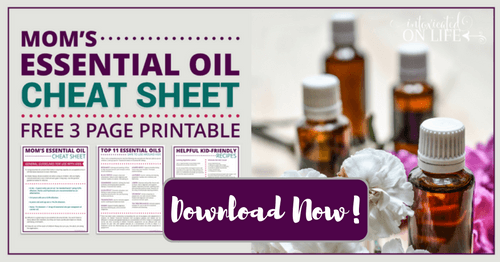
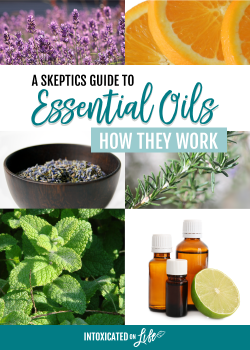
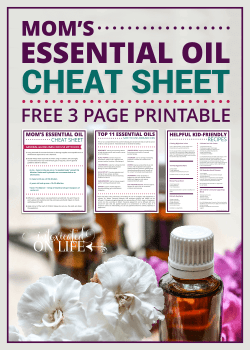
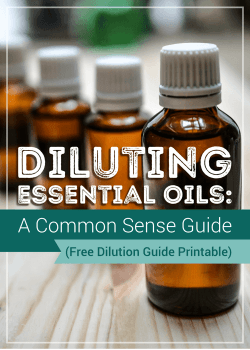
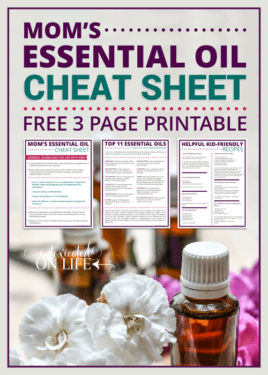


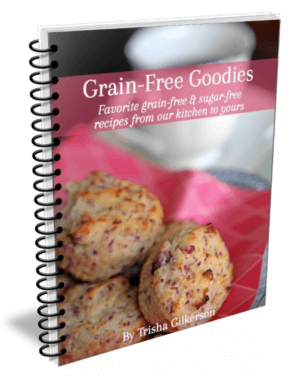
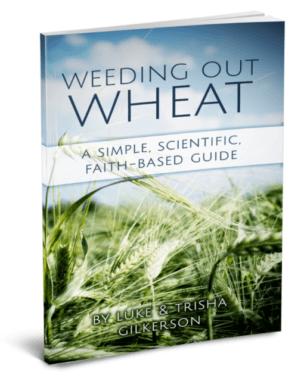

Great tips. I agree! I have a friend who loves NAN. I think we are all drawn instinctively to the oils that are best for us. I love my DT. They are the ones that speak to me. It is so wonderful to me that so many people are benefitting from natural solutions. Thanks for this well written post.
Thanks so much Janine! So glad you found oils and a company that work well for you. That’s the lovely thing about having so many choices! 🙂
Great list of FAQ! Thank you very much for putting it up together. Answered some of my questions. Am currently using lavender, lemon and eucalyptus .
2 more questions to add which I hope you can help with:
1) Are there any EOs that are NOT suitable for use by kids (say below age of 5 years old)?
2) What EOs are NOT safe for use by preggy or those trying to conceive?
many thanks!
Any essential oils you can use on adults, you can also use on children. THe key is to make sure you are diluting them appropriately. Some of the more hot oils will need more dilution that other oils (like citrus oils). Here is a list of general guidelines when diluting for children:
http://www.nativeamericannutritionals.com/dilution-rates-children
There are a few oils you should avoid during pregnancy but there are also a few that are really good to use, especially when nursing. You can find them here:
http://www.nativeamericannutritionals.com/learn-more/popular-uses/oils-during-pregnancy
We appreciate you stopping by to address those questions Alex!
One tip I saw someplace for helping to judge oil quality (HELPING; it’s still not an absolute) that made sense to me is to smell the oil from varying distances to the nose.
So, for instance, smell the oil with it right next to your nose, and then with it at chin height, and then at chest height. An oil that has been extracted or adulterated to emphasize a single constituent (like the “bad” peppermint oil you mentioned) will smell pretty much the same. But a properly-extracted oil – with a variety of constituents – should smell subtly different as the distance from the nose changes (because different ones will stand out each time).
That’s really interesting! Thanks for the tip.
Might I encourage you to check out Selah essential oils, run by two Christian ladies. It’s an amazing website full of Bible verses and the gospel (see spiritual healing). I just discovered them. http://www.selahessentialoils.com
I have been doing lots of research on EO the past couple of months and am impressed with NAN. I would love to get information about becoming an affiliate. 🙂 Thanks so much!
Great read, thank you. I am new to NAN, but pleased with their quality and business practices. I am wondering if these oils are safe to use on babies and toddlers when properly diluted? My daughter is in the ICN and all she’s ever know since birth to four months is antibiotics and surgeries. I would love to know what oils you recommend to rebuild her gut flora and if she gets a cold/respiratory issues? Thank you in advance. 🙂
Sorry I can’t answer you directly about EOs, but regarding gut flora I imagine the best thing would be probiotics – but I don’t know how to give these to a four month old! Have you asked her doctors about it at all? If they can’t advise I wonder if a nutrionist could?
I don’t know how normal gut flora develops with age, or how different a four month olds tummy is to an adults, but I just wanted to throw that thought out there in case you find it helpful. Oils may support gut flora but the quickest way would be to introduce the living bacteria.
For colds/respiratory I suggest using a diffuser with a blend of eucalyptus, peppermint, tea tree and rosemary – to help clear out a stuffy nose. The humidity from the water also helps.
If you do decide to apply oils (I am not educated enough to advise for/against or which oils) then remember that such a tiny little body only needs a tiny about of oils.
Please know that I am in no way an expert but just offering my opinion, and hoping to help (and not harm).
Hi Heather!
You have to be really careful giving essential oils to a child that young, as I’m sure you already know. There are some really gentle oils that are great. Lavender is the one that I would use and stick to until they are at least 6 m old. Do NOT use peppermint or eucalyptus on children that young, please! You can look into it more, but eucalyptus, particularly certain types, have been found to cause breathing problems in small children. Tea Tree is one you can cautiously start around 6 months, based on the research I’ve found.
I am not aware of any essential oil uses that help improve gut flora for any age, but you have piqued my interest so I’ll look around and get back to you. Hopefully your docs can recommend a treatment for your child that will help with that, or perhaps you can call a local naturopath and get a bit of free advice so you know where to go from here? Probiotics come to mind, as Nyssa suggested, but I don’t know how that would work for a young one.
Hope that helps!
So do peppermint and eucalyptus need to be avoided in diffusers too, or is it only if they are to be applied to skin?
For infants and babies younger than a year old, I would avoid these two altogether, whether diffused (which is where the breathing issues come in) or on the skin. It’s kind of inconvenient, because some of the blends contain them, but it’s worth the extra caution, in my opinion.
Well that is good to know and something I will keep in mind! Thanks for replying.
You are so great. I love this title. It helps me so much to find out which one is suitable for me. Thank you 🙂
I have a 15 year old son who has autism. He started taking risperDONE when he was 8. Since then he had rarely had a night without soaking his bed. Recently I added lavender and frankincense to his protocol. He’s been on it for about 3 weeks. He ask for it now if I forget it. After 2 weeks of use of these 2 oils he stopped bed wetting. Have you ever heard of this. And is there anything I should be concerned about? His teacher and I haven’t seen any differences in urinating during the DAY.
I’ve not personally heard of this, but sounds like he is making excellent progress. If you have concerns about if it could be harming his health, be sure to consult his doctor.
Hi, Just read your article and enjoyed the information. I have a couple of questions. 1. I trust Paul Dean. I heard from the people at Rocky Mountain Oils, that had merged with Paul Dean’s company, that he has now left the company (2016, January). How do I find out if Paul still is 100% supportive of Rocky Mountain Oils as being pure and passing all the critical tests that Paul Dean established with his company? 2. Young Living, Gary Young, says his is the only company that has a permit to export Sacra Frankincense from Oman. Rocky Mountain Oils says their Sacra Frankincense is from Oman. I need to find out the truth about this and I’m sure Paul Dean would know the answer to this question. Could you contact him and give him my email address. I would “REALLY” appreciate your help concerning this. Thanks! Diane Conrad Email :Elzmat@yahoo.com
Hi Diane,
Unfortunately, since Paul Dean is no longer with NAN, I’m not sure how to contact Paul Dean. I’m sorry I’m not able to help!
Paul can be found on fb under “Man Found Standing” I to trust and know Paul personally. You could try to message him though I know he doesn’t get on much. One of the greatest men I know.
Many other essential oil companies (like Eden Botanicals and Nature’s Gift) have Frankincense from Oman. YL is certainly not the only company that imports Frankincense from Oman.
“Young Living is the first and only company in the world to obtain permission to distill and export Sacred Frankincense in Oman and bring it into the Western world.”
The key word is DISTILL, so not saying that other companies cannot obtain the resin or oil from Oman- but YL is distilling & exporting the oil from their farm & no other company can say that.
Young Living is the only American company to distill their own frankincense in Oman- the key word is DISTILL.
Paul can be found on fb under “Man Found Standing” I to trust and know Paul personally. You could try to message him though I know he doesn’t get on much. One of the greatest men I know.
I have a joint and muscle condition, is there an oil that would help with the joint puffiness and discomfort I’m only 47 and feel 87 as bad as I hurt some days
I’m so sorry to hear that! There are certainly some oils that can help with pain, but I don’t think anything that would have any sort of long term impact or help get to the root of the problem. I’m wondering if you’ve looked at your diet to see if there are ways you can adjust that to help decrease the inflammation and help with the swelling and pain? That might be something to consider, if you haven’t.
Copaiba is amazing for this! I have body aches, joint and muscle discomfort, and with this comes discomfort. Copaiba is the strongest natural puffiness reducer, irritation reducer, or redness reducer on the face of the planet! I ingest it daily in a capsule. I make them up with 2 drops of Copaiba & top them off with fractionated coconut oil & then I freeze them.
Have a question for you. Haven’t been able to get an answer from my googling search. Do all cedarwood essential oils contain Nootkatone? Found this comment,” But because only 2% concentrate of Nootkatone is needed for repellent to work with 97 percent efficacy, people have had a lot of success using any cedarwood essential oil in the market.”
http://althealthworks.com/6916/commercial-tick-repellents-can-cause-severe-health-reactions-use-this-essential-oil-insteadyelena/.
So is this true that all cedarwood oil contains some Nootkatone or is it only the Nootka tree/wood oil from BC/Alaska.
Is it safe to mix Rosemary, Tea Tree, Lavender, Peppermint, and Cedarwood oil together with Coconut & Olive oil? Purpose is to cut hair loss and enhance hair growth. I believe these oils independently work well, but not sure if they can be mixed. Please help. Thanks.
I used frankincense on a fresh scar (on my scalp). Now I have a white spot on my scalp where I used the oil. Is there something I can use to restore the pigmentation? Or, do I have to wait for the skin to rejuvenate itself an how long does that take? Thanks.
This was a great read. There are many great oils, but I like the therapeutic grade essential oils from Bulk Apothecary.